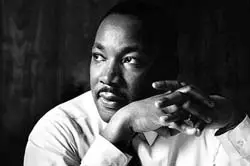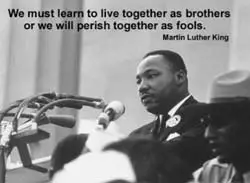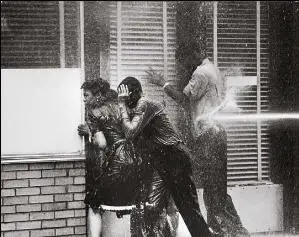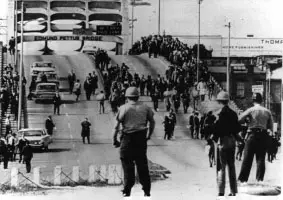Martin Luther King, Jr.
Martin Luther King, Jr. was one of the leading men involved in the civil rights movement.
He was a Baptist Minister and most well-known for following Mahatma Gandhi’s belief of non-violent protest.
King was involved in many of the social and political activist movements from the mid 1950’s until the day he was assassinated in 1968.

Martin Luther King Jr. born and raised
He was born in 1922 in Atlanta, Georgia and was from a family that had its roots in the country areas of Georgia; and his father and father-in-law had been ministers in the local church.
He and his father adopted the name of ‘Martin Luther’ to honor the German protestor that established the Protestant religion.
King’s family environment discouraged any prejudice based on race, religion or economic situation.
These lessons would be the founding base for King’s beliefs for the rest of his life.

What school did Martin Luther King Jr go to?
By 1944, King attended Moorehouse College an early-admission student at the age of 15 and then Crozer Theological Seminary in Chester, Pennsylvania.
He was considered to be a good student, but rebelled against what he thought was the more conservative religious attitude of his father.
A friend of his father, theologian Reinhold Niebbuhr, became the single individual that had the most influence over King’s growing spiritual and intellectual development.
King was accepted by a number of colleges and universities for his doctoral study which included Yale and Scotland’s Edinburgh; he chose to go to Boston University.
He graduated when he was 25 years old and became pastor of a Montgomery, Alabama church.
Rosa Parks
December 1, 1955 was the date that Rosa Parks, a Black American woman, refused to give up her seat to a white person and was arrested.
The segregation and prejudice of the time was bad and the local chapter of the NAACP met with King and other community members to arrange a boycott of the bus system.
King was elected to speak to the community and this speech started his career on the road to the many protests against unfair situations.
Southern Christian Leadership Conference
The success of King’s reception and his ability to speak to the people led him and others to form the Southern Christian Leadership Conference.
Their purpose was to address unfair practices for the Black American community and other race-related topics. He traveled all over the country preaching reform and especially non-violent protest.

Martin Luther King Arrested
Dr. King encouraged and participated all types of non-violent protest efforts including ‘sit-ins’ at lunch rooms where the black and whites were separated.
Returning to Atlanta, he took over his father’s church, and continued to support civil rights.
He was arrested in 1960 when he and 75 other Black Americans entered a department store and requested service at the lunch counter and were denied due to their race.
They continued to sit until the time they were arrested.
The story was brought to the attention of the then candidate for President, John F. Kennedy, who called King’s wife and expressed concern for the treatment.
What happened in Birmingham Alabama 1963?
In 1963 King organized a demonstration in Birmingham, Alabama.
Police turned fire hoses on the demonstrators and the attention for mistreatment became nationwide.
King was arrested along with a number of other people and it was from his jail cell that he announced the nonviolent way to achieve success:
“Nonviolent direct action seeks to create such a crisis and foster such a tension that a community, which has constantly refused to negotiate, is forced to confront the issue.”

I Have a Dream Speech
King worked with others to organize a massive 1963 demonstration to Washington, D.C. Over 200,000 people showed up and it was there, at the podium, that Dr. King gave his famous “I have a dream” speech.
Tensions were mounting in cities and towns across the country and it became obvious that change in discrimination had to occur.
Dr. King’s actions helped the passage of the 1964 Civil Rights Act and Dr. King received the Nobel Peace Prize.
What happened on Bloody Sunday in Selma?
While Dr. King always asked for nonviolence and peaceful protest, violence broke out in Selma, Alabama during Civil Rights march.
This horrible situation became known as “Bloody Sunday” and while Dr. King wasn’t there, the nation watched as police turned violent against the demonstrators.
By the time a third march was planned, Dr. King knew they couldn’t violate the restraining order that had been set in place, so instead, white and black demonstrators marched to the Pettus Bridge where the barricades had been set in place and everyone kneeled in prayer.
They then turned and walked away.
His point had been made at the bridge, without violence, but some of the less patient younger supporters began to shy away from these kinds of tactics. Dr. King made the decision to extend the protests to include the Vietnam War.
The unpopular and politically motivated war was taking American lives and many across the country was in opposition to it.
He added additional positions to address the poor and unemployed.
In 1968, Dr. King was frustrated with the slow movement of civil rights and equality and was attempting to broaden the range of programs that he wanted to address in the hope that it would attract leaders that would take action.

Martin Luther King Assassination
On Thursday, April 4th, 1968, while standing on a balcony at the Lorraine Motel in Memphis, Tennessee, he was killed by a sniper bullet from James Earl Ray who was a former convict.
King’s last words were to musician Ben Branch, “Ben, make sure you play ‘Take My Hand, Precious Lord’ in the meeting tonight. Play it real pretty.”
James Earl Ray was later sentenced to 99 years’ imprisonment for the murder of Dr. King.
Facts about Martin Luther King
- Born January 15, 1929 in Atlanta, Georgia
- His birth name was Michael, not Martin
- He went to Booker T. Washington High School
- He started his college education at Morehouse College in 1944
- Arrested on Oct 19 1960 at Atlanta sit-in
- The civil rights leader went to jail 29 times
- Awarded the Nobel Peace Prize in 1964.
- Assassinated On Thursday, April 4th, 1968
- Martin Luther King, Jr. Day is a national holiday held on the third Monday of each January.



